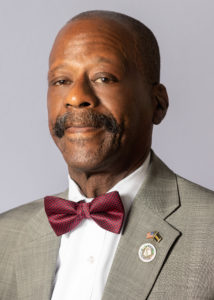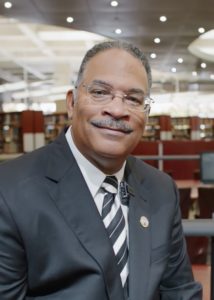
Mortuary science program honors one of its beloved professors; students remain among best prepared in the nation
Mortuary science program honors one of its beloved professors; students remain among best prepared in the nation

Duane Calloway | Photo credit: Cheriss May
In classrooms and labs inside Building 44 on the UDC campus, students learn one of the oldest and most essential professions—mortuary science. Recently the program lost one of its beloved faculty members, Duane Calloway. A former UDC-CC Mortuary Science graduate, Calloway returned to teach full-time at the University in 2013 until his death in July. His courses included microbiology, pathology, sociology, small business and the history of funeral service.
“He was a very loving and caring instructor and always focused on his students’ well-being,” said John Kirksey, program director and assistant professor. “He was a mentor and confidant.”
Calloway was also the owner and chief executive officer of Calloway Mortuary Services, Inc. and held mortuary licenses in Delaware, the District of Columbia, Maryland and Virginia. He worked hard, along with Kirksey, to ensure that students understand that academic instruction goes hand-in-hand with providing dignity, respect and care for the deceased and their families.
“We help students determine whether this is for them early on during an orientation course,” said Kirksey. “Students observe embalming during the first semester. The first thing we talk about is ethics and respect for the deceased. We don’t allow phones, cameras, or discussions about what they may see in the mortuary lab. We require total respect for the people we are embalming and their families.”
The lectures and labs for the mortuary science program are held at the Van Ness campus but are part of the UDC Community College (UDC-CC). The two-year program prepares students to master the technical, managerial, ethical and legal aspects of funeral service. Upon completing the 70-credit program, students are granted an Associate of Applied Science (AAS) in Mortuary Science. It is a part of the Nursing, Allied Health, Life and Physical Sciences program at UDC-CC. Students must complete a practicum in their senior year and take the state and national board exams after graduation. A one-year apprenticeship is also required after graduation.
Last April, the program received a seven-year accreditation from the American Board of Funeral Service Education (ABFSE). The ABFSE is the national academic accreditation agency for college and university programs in Funeral Service and Mortuary Science Education.
“Our program is one of the best in the country,” said Kirksey, who has worked in mortuary services. “Our students are getting some of the most difficult cases they will ever see. To graduate, they are required to embalm ten bodies. Most will have done more than 20, however. Some classes complete as many as 32 embalmings. That’s not the case at other colleges and universities.”

John Kirksey
UDC-CC students gain additional experience due to the University’s partnership with the D.C. Chief Medical Examiner’s Office, which allows UDC-CC mortuary students to embalm unclaimed “John Doe’s” after 30 days or people who have donated their bodies to science. Students provide embalming services and prepare them for cremation.
“In many cases, the cadavers are indigent or unclaimed. Those cadavers are cremated at no cost to the family, and they can have a memorial service,” Kirksey said.
The UDC-CC program is the only accredited mortuary science program in the District and has existed since 1973. The Associate of Applied Science (AAS) Mortuary Science Program at the UDC-CC meets the education requirements for a funeral director’s license in all states.
Full-time students can complete the program in two years, with most classes being offered in the afternoon or evenings to accommodate those who work. In addition to learning the embalming process, students participate in restorative art labs, where they learn to restore facial features and other parts of the human anatomy. They also learn to do make-up and cosmetics, as well as the business side of funeral services, including working with grieving families.
Scholars in the program range from traditional students to retirees who have decided to pursue another career. Kirksey said UDC-CC students are in demand. Some students have gone on to careers as forensic autopsy techs, funeral directors, jobs with the Washington Regional Transplant Community (WRTC), working at hospitals and other allied occupations, or opening their own funeral homes.
“The funeral homes in the area are in dire need of personnel, especially with COVI9-19,” Kirksey said. “They couldn’t handle the workload during that season and continue to have needs.”
Kirksey is proud of the UDC-CC Mortuary Science Program, which has graduated nearly 1,000 students, and many continue to stay connected to the program.
“I have a good relationship with my students,” Kirksey said. “Sometimes, the graduates call me looking for prospective apprentices. I try to match them where I think it will be a good fit. Once you are a student, I always look out for you. I’ve even had a few come on board as professors—and Duane Calloway is one of them. He will be greatly missed.”
For more information on UDC’s Mortuary Science Program, please click here.